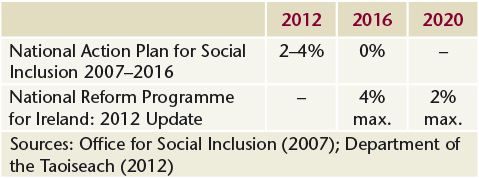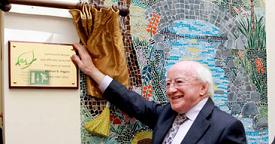President Higgins officially opens the new FAST centre in Finglas
|
Set up by volunteers in 2004 in temporary accommodation, FAST (
www.fastltd.ie) developed and expanded its service over the years. Supported by government funding and in partnership with community stakeholders, the Finglas/Cabra LDTF and Dublin City Corporation, FAST moved to its impressive new premises on Wellmount Road at the end of 2011. Last year the centre worked with 368 individuals, including substance users, family and community members. FAST aims to dispel the stigma of addiction and to
offer a comprehensive treatment with the best possibilities for long-term recovery. The treatment focuses on the mental, emotional and physical components of addiction.
Speaking at the launch, Barbara Condon, general manager of FAST, said:
It is well established that for every person caught in addiction, an average of eight people consequently suffer. Our centre here at FAST hopes to alleviate the effects of addiction for all – both the substance abuser and family members – and to help those affected to build a stronger family unit. Recovering as a family allows healing, encourages forward movement and provides the recovering drug user with a support structure that is essential to his or her success.
FAST also announced the introduction of its Recovery Coach Programme, a 12-month part-time course offered in partnership with Dublin City University's School of Nursing and Human Sciences. The only course of its kind in Ireland, it trains people in recovery from drug addiction to help others who are struggling with the process of recovery, journeying from detox through to aftercare. On completion of the course, the coaches will work on a voluntary basis with FAST.
FAST was short-listed for Biomnis Healthcare Innovation Awards 2012; it has also been nominated in the Allianz Business to Arts Awards 2012 and has been shortlisted in two categories – Best Creative Staff Engagement and the Jim McNaughton Perpetual Award for Best Commissioning Practice.
Fall in numbers on waiting lists for methadone treatment
Newly published data from the HSE1 show a reduction in the number of people waiting for methadone treatment in Ireland between March 2011 and April 2012. At the end of April 2012 there were 187 people waiting for treatment, compared to 230 in March 2011.
Most of the 48 clinics listed reported a reduction in waiting times and also in the number of people waiting for treatment; 22 centres reported no waiting list. The average waiting time was 0.8 months. These figures include data from new clinics in Kilkenny, Tullamore and Wexford that were set up in 2011. The clinic in Portlaoise reported the longest waiting list, with 24 people waiting for treatment at the end of April 2012, and an average waiting time of 5.7 months.
In a press release on publication of the new data2 Minister of State Róisín Shortall TD stated: ‘At a time of cut-backs, HSE management and frontline staff deserve credit for making good progress and for doing more with less. … With the data now available we can assess more accurately the areas where treatment provision needs to be boosted further and I will work to address these needs over the coming months.’
Implementing an IT system in drug and alcohol services
On 14 June 2012 Progression Routes Initiative (PRI) hosted a one-day seminar on information technology (IT) system implementation in addiction services. Merchants Quay Ireland hosted the event in their new premises in Dublin.
The objectives of the seminar were:
- to provide an overview of IT systems which have:
o capacity to support the national rehabilitation framework for case management and Quality Standards in Alcohol and Drug Services (QuADS),
o proven functionality,
o capacity to communicate with the National Drug Treatment Reporting system (NDTRS);
- to explore how IT systems can support continuous quality improvement in addiction services;
- to outline how learning networks and logical model can support IT implementation and reduce costs.
Fran Thompson, who works in information and communication technology (ICT) services in the HSE, provided an overview of the HSE’s development plans in this area. The keynote speaker, Martin McCormick, ICT director at Beaumont Hospital, addressed issues such as information storage, business continuity, data ownership, security, data standards and compliance with EU standards. Following this presentation a number of workshops explored how IT systems can support client work as well as staff, management and stakeholder requirements.
Four IT system providers, EPS, Icarus, Hanlon and eCASS, presented overviews of individual systems, covering: visual display of user interfaces; case management and other functionality; outcome reporting across a variety of service provision areas; and flexibility for adaptation and cost.
PRI has prepared a document to assist organisations in identifying their needs and selecting the most appropriate IT system provider. This document describes the systems currently in use and covers issues such as system functionality, data storage, security, data protection compliance and cost. For more information please contact Caroline Gardner, PRI co-ordinator, at
caroline.gardner@aldp.ie.
Lord mayor’s commission on antisocial behaviour
A commission on antisocial behaviour established by the former lord mayor of Dublin, Councillor Andrew Montague, issued its final report in June 2012.3 Commission members included elected councillors and representatives of Dublin City Council, An Garda Síochána, the Irish Prison Service, the Probation Service, the Health Service Executive, the Youth Justice System within the Department of Justice and Equality, the Northside Partnership, Ballymun Drugs Task Force, the Ana Liffey Drug Project, Dublin City Business Improvement District, and an academic from the Department of Social Work and Policy in Trinity College Dublin.
The Commission met nine times between October 2011 and May 2012 and also organised a conference on the theme of preventing and responding to anti-social behaviour attended by over 300 people.4 The report and recommendations of the commission are presented across a range of themes, including the following: early intervention and prevention, education, discrimination and prejudice, management of offenders and alternatives to prison, alcohol and other drugs, city centre issues, and design.
Specific recommendations in relation to drugs include the following:
· Prevention and education
Ø Deliver a national awareness campaign on the dangers of using alcohol, cannabis and other
drugs during pregnancy and ensure that clear drug and alcohol policies are developed and implemented in each school.
· Drug-related crime and intimidation
Ø Assist the roll-out of locally based systems of support which address issues related to family intimidation and drug debt in areas with concentrated drug problems and which build on the north east inner city pilot project.
Ø Expedite plans to identify key Garda personnel at district and divisional level who would be designated officers for families and individuals requiring support as a result of intimidation.
Ø Establish local and national intelligence systems to gather information on drug debt and liaise directly with the Criminal Assets Bureau.
Ø Develop a system of notification between Gardaí and HSE Children’s Services for the early identification of children who become involved in criminal activity (often related to drug dealing).
Ø Identify effective systems of family intervention and supports in this regard.
Ø Empower the gardaí to prosecute in cases where offenders are found to be trading prescription drugs.
Government revises poverty targets
In its update on Ireland’s national reform programme,5 published in April 2012, the government announced it was abandoning the national ambition to eliminate ‘consistent poverty’6 in Ireland, as set out in the National Action Plan for Social Inclusion 2007–2016.7 This decision was made following public consultation, engagement with key stakeholders, and an EU peer review on the setting of national poverty targets, an event which Ireland hosted in June 2011, and which was attended by nine member states, the European Commission and European stakeholders. The table below summarises the change in ambition.
Targets for reduction of consistent poverty, Ireland, 2007 and 2012

Explaining the change in its update, the government stated that between 2008 and 2010, ‘ … numbers in consistent poverty rose from 186,000 to 277,000, representing an increase of almost 50% on the 2008 figure … the rise in the numbers in consistent poverty over that period reflects the impact of the economic and fiscal crisis in Ireland, and in particular almost a trebling of the unemployment rate from 4.5% in 2007 to 13.6% in 2010. There was also an effect from the programme of fiscal consolidation on social welfare adult and universal child payment rates’ (p. 15).
1. Data on the waiting lists can be accessed at: [Data no longer available]
6. ‘Consistent poverty’ is defined by the Social Inclusion Division in the Department of Social Protection as’ the proportion of people, from those with an income below a certain threshold (less than 60% of the median income), who are deprived of two or more goods or services [an 11-item index] considered essential for a basic standard of living’.

